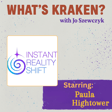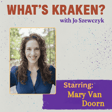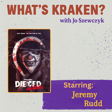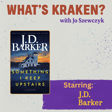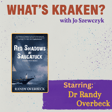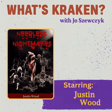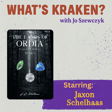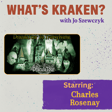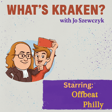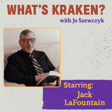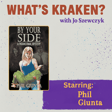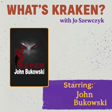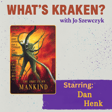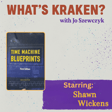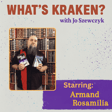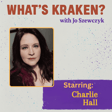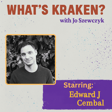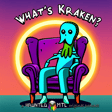Become a Creator today!Start creating today - Share your story with the world!
Start for free
00:00:00
00:00:01

Horror Meets Hollywood: Anthony M Carro on What's Kraken with Jim Phoenix
Dive into the chilling world of horror author and screenwriter Anthony M Carro. Uncover the secrets behind "Dreaded Invocations" and get exclusive writing tips from this master of terror.
Transcript
00:00:00
Speaker
Hey, everyone, Jim Phoenix here and we've got Anthony M. Carroll for today's podcast. That's right. We've got the writer and screenplay extraordinaire. We talk some deep dives into the genre and a bit of author talk at the end. All this and more on next what's cracking. Hit it.
00:00:27
Speaker
Hey, everyone. Jim Phoenix here. And in today's What's Cracking, we've got none other than Anthony M. Caro. And if you know anything about horror, you know Anthony M. Caro. It's a pleasure to have you here. I'm so glad we can make this work out. I have a few questions for you, and I'm going to flip back and forth between author and then movies, author movies, author movies. Sound good? Awesome. Yeah, sounds great. It's great to be here.
00:00:57
Speaker
Very, very cool. Now, for your author work, did that come before the screenwriting work? Yes. And um yes and no. um What happened was was I originally wanted to write prose when I was very young and I found my way traveling through ah the film industry in Hollywood and, you know, um the as an assistant working in offices and things like that. And I was a creative person. I think I was an idea person. But even though I was working or had done a lot of writing, a lot of nonfiction writing, a lot of my published work, original work, were were nonfiction, a lot of nonfiction ah for magazines, smaller magazines, mid-sized magazines ah on um
00:01:51
Speaker
horror movie themes and histories and things. and then I mean, I might still do that today for horrornews dot.net. um But I was thinking story-wise, I was always thinking more like a producer. I think my my my that you know that that's developed. For those of you unfamiliar with that spirit of the movie industry,
00:02:13
Speaker
development will be the development of a screenplay or well, eventually it has to be the development of a screenplay because that's, that's what they focus on the story, but it doesn't always start as a spec, a script or or a commission script. It could be a novel or a rights to a true story or or whatever. And I found myself in development and I started to write, I started to try my hand at doing my own screenwriting.
00:02:43
Speaker
And but I kind of geared more towards producing and then I kind of shifted into becoming a writer in marketing, marketing related writing, copywriting and all that. And when I was younger, I was I loved the Martin H. Greenberg short stories. He was an editor and he put out a bazillion compilations. I mean,
00:03:08
Speaker
When Francis Ford Coppola's Dracula came out here, there was a Dracula Prince of Darkness, short stories by all the top names at the time. And Christmas time, he came out with, you know, Goes to Christmas Past, present, future, collection, and all this. I mean, it was great stuff. And then there were other guys like, you know, Hot Blood by, you know, Jeff Galvin and all that. And you know, a lot of the paperback from Hell, it was a big paperback from Hell Reader. So I think that
00:03:36
Speaker
In my reading habits and my writing habits, I kind of was into nonfiction almost 80-85%, unless you count comics for books. i mean I was still a comic book reader. I would i read um um consistently read that well on and off for 20-25 years.
00:03:52
Speaker
um What happened was was I never gave up on reading non-fiction. like I would get like Michael Crichton's stuff or i would if something grabbed my eye, i would I would get it, but I was mostly a non-fiction consumer.
00:04:07
Speaker
and I wasn't really concentrating on fiction until maybe four years ago. and When i wanted to I wanted to do some writing, I didn't want to do screenplays. I wanted people to actually see the stuff. So I geared myself more towards trying to write short stories or or writing ah novels and all that. But right from having worked in development, I knew that it's a little, it's wise for a writer to take on what they can handle.
00:04:38
Speaker
And since I had not written a novel, I was not going to write a novel right out of the park. I knew that a novel that AKA something that was 50 pages or a novella, you know, like 100 pages, 120, 90 to 110 pages or whatever. I think that's where you kind of belong for me anyway, starting out.
00:05:03
Speaker
not to tackle something that turns out to be 300 pages, because remember, you have to edit it. You have to tie up all the plot holes. You have to make sure everything makes sense. you know you have to Do you have a manageable number of characters, or are there too many, you or too little, or all that? And you don't you don't want all that, you know your first work, at least for me. um you know For me, jumping into something that would be 250, 300 pages, no, I didn't want to do that.
00:05:30
Speaker
So I was, I started focusing on shorter stories. And when I went back to Los Angeles, I was focusing on looking for, uh, production assistant jobs, grip jobs, things like that. I wanted, I didn't want to go, I didn't want to go back to development. I wanted to get to be on set. And while I was doing that, it was also fiction writing. So both of them kind of converged. Um,
00:05:58
Speaker
But love so when you're doing this, do you think it's because when you and I both started, e-readers weren't a thing. yeah We had to have the paperback. We had to have the magazine. We had to have the the paper copy, right? Yeah. And that made us read more. Now it's kind of like you had the e-reader 2000 books around it. You probably read one, you know, i I remember I absorbed a lot more. I am. This is, you know, man, it's like you're almost forced to skim a lot of stuff. And you're also in a way, I got to put my laptop on the table and go about my business. And I have Netflix on in the background because I got it, you know, just for career career wise professional, I have to catch up on this stuff. And I just don't have time to sit there and watch the whole thing. So a lot of it is just like, I'm catching it in the background. do You know what I'm saying?
00:06:55
Speaker
So and same with reading, I have to skim a lot of it because so much of it's out there and so much it moves so fast. But back in the old days, yeah, man, I mean, you got a book and that was it. And you had to read it. I think you absorbed it a bit more because you didn't want to necessarily rush through it unless you had, you know, extra cash to spare to just keep buying books, buying books, buying books. So I kind of like to take my time with them.
00:07:20
Speaker
um But that that was that was a totally different totally different industry. you know like Different era. Did you grow up? with the ah movie adaptations, you're talking about the Bram Stoker Dracula thing. I remember like Friday the 13th came out and then Friday the 13th, the book came out, which is basically a screenplay, which is kind of doctored up a bit. That book's worth a lot of money. I was actually trying to track a couple of them down, man. There was a whole series of Friday the 13th books and they're out of my price range. The one I was tracking was probably one of the worst books ever written was ah Eat Him Alive.
00:07:55
Speaker
which is You yeah ever see the deadly man as you know the old nineteen fifty eight yeah you know giant bug movie this is like a crime caper giant bug movie like we're. Insanely gory book it's and it's really stupid just really stupid ass book i mean yeah and get good for like eight hundred hours a copy.
00:08:16
Speaker
And that's the thing, like the things that we should throw away as a kid, back in the day, these books, I made this comment, I don't have the book up here right now, but when Stephen King was like $5, a Stephen King book went for, you know, $4.95 plus tax or whatever it was. yeah And that was like the thick, big books. Other ones were like $2 maybe, not so much anymore. And now, the ones we just threw away are worth a couple hundred dollars because of like the nostalgia aspect of it. or And it's just rare, you know, there wasn't a big, big print round. I mean, it wasn't, you know, I mean, if apparently see in those days series, well, even today, any, I mean, even with the ebook market, anything serialized or part one, two, three, four, five, six, seven of a series. If you hook somebody, they went and they bought the other issues or the other books, I should say. So if so if you have five Friday, 13th books and somebody bought the fourth one and they liked it, well, you know,
00:09:12
Speaker
Maybe they'll go back by the second one and then the fifth one comes out and they bite. So you've got one reader, but he's a customer, he's a three-time customer. So you might not have a huge, huge audience base, but you have that core base that you move 20,000 copies.
00:09:31
Speaker
30,000, but you're not going to have a second print run. there's There's no, there's no buyer for it. At least not those. But the back, the back ah catalog, I was just at the Indian con in ah Florence, Italy. And someone said this, and I think it's very true. That is the back catalog. They're new to somebody. Everyone's old books is new to somebody.
00:09:57
Speaker
And so you get that second reader, and then he goes back and buys the rest of them, right? That's the key to that i think that's the key to any indie book or any pulp publishing. um You want to get that that that guy who comes in or that girl who comes in and picks up your new book or a book, and then goes and buys three other ones. I mean, I mentioned this on on another show. um It's like Kiss, the the the rock band. Yes.
00:10:25
Speaker
Their first three LPs did not sell. I mean, I think one of them only did 70,000. I think another one, 110,000. They weren't recouping, but it was costing to make. And then they did a live, a live boom goes gold. And then it goes beyond gold and people, new fans, they come in. Well, the three albums that found became records there. like I got nowhere.
00:10:52
Speaker
Yeah. They were still in print. People went and bought them. So, you know, that's, that's with authors too. But but yeah today it's different. See, in the old days, like Jack Ketchum, I really dug Jack Ketchum. Really? Yeah. he He was great, great writer. He had that super shocking, extreme book. The first one that he, that he did, um, uh, off season, off season sold like 300,000 copies, uh, on the paperback. Mario Valentine put it out.
00:11:23
Speaker
Um, one of many books that sold a hundred thousand, 200,000, 300,000 copies, you know, like like in those days it was, it was, uh, uh, it wasn't super blooded, I would say, because once you ran out of customers, you're, you, you know, you got to make money or your publishing house is going to go out of business. He didn't have print on the end in those days. So I,
00:11:48
Speaker
like Brian Lumley, I know who Brian Lumley was, you know, the guy came right, can't remember the book series he wrote, but it was like a horror series. But I remember the name. The reason I remember the name is because when you went to in the bookstore, I mean, he wasn't Dean Coons, he wasn't Stephen King, but he but he was there and he had a following, had like eight books or whatever. John Saul be another guy like that. You know,
00:12:15
Speaker
So it wasn't that many people. And and you kind of had tears. you had you know Then you had the second, I don't want to say second tier guys, but people who wrote for the magazines, wrote for the newsletters, wrote for, you see them in a lot of anthology collections. you know you yeah um they you know they were They'd have their own books out there, but they were not million copy sellers. They were just people who consistently sold and consistently could contribute.
00:12:43
Speaker
um I don't want to say that doesn't exist today, but I went into a Barnes and Nobles and it's like and almost nothing. There's nothing there. It's like a fractional. Yeah, be there. It's it's a bit weird. I remember the science fiction anthologies as a um Isaac Asimov's anthology show many great story your writers are there.
00:13:06
Speaker
that would appear again and again and again and again and again. And then you don't really have the outlet for the people who might have the short stories to sell or the smaller works to sell to an anthology. Because if you look at ah for those at home, go to your local bookstore.
00:13:24
Speaker
After you get past the candles, the mugs, the sleepwear, and all this other ah stuff that they sell that aren't books, find the bookshelves and see how many bookshelves are dedicated to your favorite genre. The anthology guy has nothing. Horror is getting a bit better now, but it used to be like that one half shelf for a long time. You know, it's it's hard. This really is. Well, the horror paperback market, and I'm saying that's um We're talking pre-ebook, pre-current landscape, because now everything's print-on-demand, everything's digital. um right in the old as printer In the old days, ah
00:14:05
Speaker
if you couldn't get published in a magazine that people read, like Alfred Hitchcock Mystery Magazine, and that was really hard to get published in that. i mean or or Or any newsstand magazine that had $300,000, $400,000 circular. Three or 400,000 people circulation.
00:14:22
Speaker
right you know well wrote for small press publications, fanzines, this or that, wherever you can you get your stuff published. And I guess, you know, you can work your way up from there. um i mean You mentioned you know so science fiction anthologies. there i was like Mirror Shades was a really cool one. That was a Cyberpunk one. ah Burning Chrome was another good one. Harlan Ellison, I was shocked when I read this. He did Dangerous Visions, which was a mess. It's still in print today after 50 years. yeah yeah Great collection of sci-fi short stories. and It was the number one bestseller. Sold the most copies of any sci-fi anthology.
00:15:08
Speaker
ever published at the time it came out and lost money. We lost fifteen hundred bucks. It just tells you the whole thing. But you're right. A lot of it came from if you could get into a fanzine. Great. That's a stepping stone to the next area. Great. And that's a stepping stone to the next area. Some people started as newsletters like the actual we we hear newsletter. We think about the email we get. No newsletters you had to buy and subscribe to.
00:15:35
Speaker
Yeah. I mean, you know, and they would send them to your house, you know, like oh I used to subscribe to a billion of them. I mean, this is, I mean, this is before the internet, like back in the eighties and yeah in the early nineties, you know, a dollar quarter, 50 cents, you know, two bucks. And you would get Xerox stapled newsletters from, from very obsessed, obsessed people writing on a lot of crazy different topics. like ah i don't want to I don't like to single anybody out because then I've got to leave so many of them out. but ah yeah one of the you know Spaghetti cinema is always the one that that sticks in my mind. because that was you know that was ah a stay was it I was like 8 by 11 staple on um spaghetti westerns. you know and it was like really
00:16:23
Speaker
you know you't You couldn't go on the internet and and type in Spaghetti Western and read 50,000 million pages. i mean In those days, you did couldn't even get a book on it. I don't think there was any major books about it. No, the Spaghetti Western is a very specific. like I can only name the ones that Clint Eastwood were in. I don't know if any other butty guys Spaghetti Westerns exist besides Clint Eastwood's.
00:16:47
Speaker
There are a lot of them, there are a lot of them. There has to be a ton of them though, right? But we see the genre as the one that rides the Titanic iceberg when we see the tip of it. A lot. A lot of people didn't know they were seeing a spaghetti western until they went into the theater and it was dubbed. It wasn't like they were going to tell them that on the advertisement. Right. Because actually a lot of people didn't dig dubbing.
00:17:10
Speaker
um But yeah, but you know today's landscape is a lot different today. You can self publish on a lot of platforms and you have e-books and it eliminates the need to go with shop. You know, it eliminates the, you know, where you have 10 manuscripts, nobody reads them, you're trying to shop them around. And quite honestly, a lot of times they're getting their stuffs commercially viable and probably better than a lot of the stuff they're they're they're publishing. But, you It didn't see print. And now today, you know, I mean, there were always vanity publishing services, but, you know, they, you know, costly and they still exist today, but they're, yeah, they still exist. and for an oil man you but yeah But print on demand with, we've got things like, well, the the monster in the house right now of Amazon, who used to be just a bookseller, by the way. We have Book Vault.
00:18:06
Speaker
who does an amazing print on demand, especially if you want anything in color inside of it. Amazon will charge you the entire book of color. Book Vault only charges for that page in color. so If you want to do comic books, if you want to do anything that's going to be great, I always, you know, BookFelt is the best in town, I think. But we have these services, right? We don't have to have our basement filled with 12,000 boxes making a box fortress of books that maybe don't sell. Because we now have this print of demand, client comes in, press the button, prints out in a day, and they start to get it, right? You don't have that overhead. like and and and
00:18:46
Speaker
the money that you're saving, you can put into what is really, really, really important advertising, because if you don't advertise it, it's not going to move. Like I just was reading today, like Terrifier 3 is ah projected to do 15, 15 million bucks at the box office. And this is what shocked me. The massive, massive, massive, massive amount of their advertising was strictly Instagram, Facebook, social media.
00:19:14
Speaker
And I think they got something like 86 million views on on some videos or whatever, YouTube or whatever. That to me is not a whole hell of a lot different than 1985. Like a one or two in the morning, we watched like You know, the boy who cried werewolf at like 1 a.m. And then these UHF channels would have these, you know, these 15 second spots for a movie. They weren't 30 seconds. 15 seconds is cheaper. So they would put 15 seconds of a movie and then 15 seconds of like ice cream, you know, like buying ice cream birthday cake. so
00:19:53
Speaker
that But the 15 seconds would be to like the Duke and Duchess Grindhouse, or it would be to the ah the Sam Eric or the Eric's Place. And and they would be the only theater where they'd be like maybe five theaters carrying an exploitation film. And in a way, instead of UHF, they're just going on Instagram and they're doing essentially the same thing, just targeting that audience.
00:20:17
Speaker
for that big opening weekend. And there's no expectation what it's going to do next weekend. They could they don't know if it's going to sustain or drop 90% because it's ah it's such a ah classic front-load advertising campaign where you just want to get everybody there that weekend. Yeah, one week only, maybe two weeks. And that's the way a lot of horror movies were, man. They they rolled in and out of two weeks for many, many years. they pulled Oh, absolutely. The 50s to the 80s.
00:20:45
Speaker
the the The exceptions were probably Nightmare on Elm Street, like the house that Freddie built, like the first one, because it was something like, oh my God, we didn't see. It might have lasted about a couple of weeks. It's not the long stay where like, what was that one Avengers movie on for a year so you know was like yeah have lots of theaters in the year? I remember seeing the TV ads for Nightmare on Elm Street and they were creepy as all hell.
00:21:12
Speaker
I did not see the movie in the theater, but when it came out on VHS, I you know i rented, I was like, wow, this is cool. And part two comes out, I went to go see part two. I and don't remember exactly how much part two did. I know part three did 45 million, but part two did it in the 20, 25 million. yeah It was a big hit. The first movie, I don't think it did, I think it did about 10 inches. But enough to make another one.
00:21:40
Speaker
enough to make another one and the the whatever money, you know, I, you know, if you look at it from a trilogy, whoa, they cleaned up. Yeah. they That's the thing. Like yeah we're talking about before, if someone sees, like you said, part two, a now you want to see part one. Yeah. And BHS rentals were royal, you know, that was a money stream for a secondary stream. Yeah. like we be you for a long time Terrifier one was basically, you know, a very lengthy,
00:22:10
Speaker
six years, whatever, ah advertisement for a sequel that never came, never came, never came. And then I'm calling an advertisement because it's just been out there drawing an audience for six years. So a new movie comes out and you know the audience was bigger than they thought. And that was the same thing with ah Helm Street. You know, the the audience turned out to be a lot bigger uh, with the sequel because the movie came out, but I think more people saw it on video. So like the original came out and not that many people saw it, but they saw it on video, sort of cable or whatever. So when the sequel came out, massive audience turns out for it, you know, it's like, uh, you know, commercial is the first move. Yeah. So yeah, that's it was basically a big promo for, for, you know,
00:23:00
Speaker
the franchise when the franchise kicks into gear, you know? Yeah. And now that segues into you are a writer in a lot of horror. What do you see for your own writing? Because it looks like you're getting like dreaded invocations, terrifying horror tales to utter in hush tones. Is this going to be more of what you're going to be into versus writing screenplays?
00:23:26
Speaker
Are you going to go more into your, your authorship? You know, you're, you're going to waste the, uh, I was commissioned a while back to do a screenplay and it came out very well, but you know, the, the financing and whatever just materialized, which, you know, as John Carpenter wrote a lot, he wrote a mini series for the beast. Peter Benchley is the beast. I didn't even, I, they made it, but but they didn't make what is screenplay. So a lot of times, you know, people get commissioned for works that don't come out, yeah but, um,
00:23:58
Speaker
with the not with a novel or a podcast or a audio, audio theater podcast or any underlying property. You can sell that. You can sell. That's my development background. I don't write a screenplay because I want to get, I want the stuff to go out there. I mean, I can write the novel. I can write it far more engaging in a in novel form, you know, to directly entertain an audience. Right.
00:24:26
Speaker
And then if somebody wanted to convert it into a screenplay, I know the difference between a novel and a screenplay. And I work in production. i knew yeah I know how to do business. You know, I'm not going to, you know, i you take the novel, now you turn it into a screenplay and the screenplay has got to be truer to its format, right which is a nice way of me selling. Look, you want to buy my book? Cool. But, you know, give me, give me, you know, part of the deal, you know, take, you don't have to use it, but give me first draft on the screenplay, you know, because The screenplay is going to get rewritten 65 times when I have 20 people involved. A lot of them you are not even going to get credited. so you you can't You can't marry yourself to the screenplay. it's it's so i know My shtick is basically this. I would prefer to write the novel or write the fiction piece or whatever. or
00:25:20
Speaker
podcast or whatever, and then then then it's intellectual property. And then then if somebody's interested in it, then we'll talk about a screenplay. But in terms of writing a spec screenplay, it's like, no, why? i know i it It wouldn't make sense for me because i like dread it in like my previous books did not sell that well, but dreaded invocations because it was marketed better and it you know or marketed more comprehensively had a price, I think, that befit and author that nobody ever heard of. Um, it moved, it moved, you know, you know, it was a, it was a modest success so far. It's still in print still, you know, sold a copy yesterday and it got 500 pages read on, uh, on, uh, kind of limited it. I mean, I know some people who get 4,000, 10,000 reads a day, but you know, they've been at it a lot longer. Um,
00:26:18
Speaker
And it's a lot of little. Yeah, you have to set your own concepts of success. And I used to do spec scripts and I used to be the person that do for rewrites or so. And you're right. It's really weird but because by the time you're done with it, you know, 12000 other writers also write something and you might not get credit at all. And so the movie you you wrote won't be the one on screen necessarily.
00:26:46
Speaker
david Whereas a book, the move the book you write is the book on the page. yeah and know They don't take that away, right? there's you know i and don't People don't like to talk about this, but there's there's promotional benefits to having something in print.
00:27:03
Speaker
Um, you can always cut a press release on it. You can always, uh, even if it's been, you haven't marketed in six months, like I said, it can be due to somebody else. And new to someone else you can book yourself on a podcast to talk about a book you wrote six years ago and they don't know if it's six years old, you know, unless you tell them. And, uh, you know, you, you can, you can slap your face on, uh, a blog article or, or a, yeah social media posts with that would be the book next to your face and your name and send it out there and you can promo it. You you can't really do that with screenplay. I mean, you can. You can say, I finished my screenplay or you know I won this contest or I got second place in it. you know But i just I just think that that something direct content wise, like either a book, you
00:27:58
Speaker
I'll put it as if I were just only doing spec screenplays, I'd still want to get myself out there somehow, like on Instagram or something like that. Like maybe gimmick Instagram where, you know, like, uh, uh, Talked about screenplays, you know, make a channel or something about, you know, what you think about screenplays and this and that. Oh, by the way, um this is what I've been working on. Although I don't recommend.
00:28:25
Speaker
don't even remotely recommend talking about work that you did. I wouldn't put it out there unless it was, unless you were really protected, you know, by, you know, yeah, and play write it and all that. And a lot of the, uh, okay. if If you are doing a spec, so that's going to be mostly you, but if you're going to work on something to fix up, like they used to call it script doctoring, I guess,
00:28:50
Speaker
where you might be underneath the NDA for a long time. So you're like, Hey, what are you doing next? I can't tell you. How about that? I can't tell you what's the last things, things you did. Can't tell you. Yeah. Yeah. Yeah. I've had some NDAs. You sure you're right. Like I'm sure I write. I just can't tell you if you bought it. I've had some NDAs for like some, some, uh, reputation management work. I did like press releases and things like that.
00:29:14
Speaker
And you want to tell people because it's like it's cool stuff, but you can't. yeah yeah at all yeah I don't even tell people I've done done press releases. for um In general, I know a lot of times I don't even mention it because a lot of it's NDA stuff. so Right. i can't It's like you can't talk about it at all. And that's sometimes part of the ah ah more frustrating thing about, a hey, here's my like portfolio and you can't list anything you've done for a while. Yeah, we're just talking about it in in general. We're just generalized.
00:29:49
Speaker
but i um Yeah, to me, like it was this this past two years, it has been a big learning experience. Like I did the book Tragedy Man, which, you know, the people who read it really liked it. And that was serialized first on Amazon's smaller serialized platform before coming out as a book. And it didn't it didn't sell because I i use an archaic marketing strategy. Really? Yeah, it's just I
00:30:22
Speaker
I thought about the you know the big open, you know like try to... you know, massive open out like sale and all that. mean That's a publishing thing. Like for an indie author, it's, you're picking up people here and there. Like, like you can do like, I mean, when it's new and it's a completely new book. Yeah. I mean, you know, you still want to open it. You want cause i bump on yeah Amazon, especially. Yes. And nobody's read it. So you might as well grab as many people as you can, but it's you, you have to keep advertising and you can't hope that you know reviews are going to show up and word ofout
00:31:01
Speaker
People are going to rave about it and this and that. It's not traditional publishing. it's you know They're not getting all these free copies from the from the publicist and all that. you know So you have to just keep running ads. And I kind of like to do it like this. you know like You run them for a while, then you cool it off, and then you come back. Go up and down. Yeah. Because you know sometimes you know you don't want to keep spending money to reach the same people. And people already bought it. you know and Right. And for a serial, did you wait for the first like one or two, maybe sometimes even three to be done and then push it all at once? No. Or do one, two and three. Okay. No, no, no. What happened was, what happened was I would generally not start anything until I knew how it was going to end. And that's again, that's coming from my screenwriting background.
00:31:55
Speaker
Um, meandering screenplays are disastrous. Um, meandering books, you can get away with it. Uh, unless you're really meandering, unless you're really getting into sub pots that, you know, that are modeling your, your, your work. So what I would do is I, one of the, one of the best bits of advice I ever heard was, was, um, if you know the end thing, you'll built towards it, you'll you'll know what you're writing towards. And not everybody does that. And it's not right or wrong. It's you know, some people like to write by the seat of the, you know, fly by the seat of their pants. Right. You know, and some people will say, don't do that. But there have been many people who've done that and done great work. But as for me, I kind of need a bit more structure. So I kind of like to have a premise, you know, like like a general premise of what I want to write about, who I want to write about.
00:32:47
Speaker
and what their general goal is just in general. And then I stopped thinking of like random scenes and stuff that's cool and all that. And I said, okay, but what what's what's the end look like? what' What's going on at the end? And then once I can come up with how it ends, then I kind of create a middle.
00:33:11
Speaker
doesn't mean case right Doesn't mean I have to write all this or have to be super good. I just need a brief outline. Like who is it about? What's going on? What's the conflict? You know, in the middle, I mean, is there what twists, what's like a general one or two twists that kind of shift things? And then how does it conclude? Like I said, in general, like, and then when I go to serialize it,
00:33:39
Speaker
I would try to think about like three chapters in a row because I didn't want to write one chapter. I mean, I used to do this one chapter, then come back two weeks later and it's like, uh, you know, where, but where was I again? You know, so I kind of like to think in terms of three or five chapters are like generally like what's in those three or five, you know, I don't have to detail it or or write a treatment or anything. I just have to really have some bullet points where I literally will just put some bullet points down and then I can free flow.
00:34:09
Speaker
the story. um My stuff, I cheat a little because i i I grew up in Philadelphia, spent a lot of time in New York, spent a lot of time in Hollywood, bounced around the globe in the last few years. And you know, particularly in Philadelphia, New Jersey, North Jersey, you know, you meet some quirky ass characters. And you meet a lot of loud, meet a lot of loud mouths, a lot of kooks.
00:34:36
Speaker
and especially going to dive bars in Lake New Jersey or Queens or whatever, and or just live life, just walk down the street and just whoever you talk to. and So I kind of had an ear for quirky dialogue, just just and I kind of put that in the in the end of the books, but I kind of, although I had an idea about the narrative, the beginning, middle, and the end, right I kind of like to just let the character carry the story. you know In other words, the character's personality, their quirkiness or their hang ups or whatever, or their attitude or their perspective, it's always focused on them. like Chinatown would be a screenplay that that has that kind of approach, where you're you're reading through somebody else's eyes, you're experiencing it through somebody else. Now, it never deviates from having a good beginning, middle, and an end, but it's just not it's
00:35:35
Speaker
it just comes alive or because becomes more characters driven. And but that's really what what motivates me to do it. You know, cause if I just had to write a plot or then it's just generic 0.8. Okay. It's over. That's gotta be the character. Yeah. That that kind of keeps me moving. So that, what I mean by helps me cheat is, is because you're in the head of the character, um,
00:36:02
Speaker
If you meander a little or whatever, it's forgivable because because you're you're focusing on this dude or this this woman's um outlook on on whatever crazy situation they're in. And yeah, but yeah in horror, I think that's ah I don't want to say super rare, but a lot of horror is very plot driven. It's very shock shock oriented.
00:36:24
Speaker
ah Character driven horror is is is not Oh, I shouldn't say it's and it's uncommon, but it's it's right. It's uncommon. But when it works, I mean, it works really well sometimes. And then I have a question because I OK. The way I write a screenplay, I will get all you know, I'll get the acts done. I'll get my major beats and I'll make the connection scenes to it. Right. This and this and this and then and if I change because the character does something great, I change it. The way I write a novel, I don't outline.
00:37:00
Speaker
I almost do the opposite. So you actually take your screenplay knowledge and you go, I can write this way and have the structure first, right? Yeah. um Well, but a novel a lot of time, like I said, meandering is OK in a novel. A screenplay, you're you're very condensed to time and you're very, yeah very condensed to sticking with the story and the primary plot. You know, you've got 90 minutes, 120 minutes.
00:37:31
Speaker
A lot of when you look at deleted scenes on a Blu-ray, it's like, well, yeah, yeah, no wonder they deleted it. It's killing the pace. And it's and yeah, and it's not even off topic. I mean, some of the stuff is is fits in the narrative, but they got it. You know, they got to trim it because it's just, you know, too long. So if screenplays just got to stay focused and move and it it it can't drag. It can't meander. With a novel, you can always circle back. You can circle back.
00:38:00
Speaker
So you know you but you you can even insert, for lack of a better word, stuff like like George RR Martin. you know You might go three, four pages as something that's theoretically off topic, but it's never really off topic. He leads into it and then he's smoothly and then he's circling back smoothly and you got yourself an extra four pages of bang for your buck. you know yeah and And one day he'll finish that book. and One day. We'll see. I know. I think something else can finish them. But for books, you've got which books you're working on now. You have dreaded invocations, terrifying horror tales to utter and hushed tones. And that's on Amazon right now. Yes. Yes, that is. The book is exclusive to Amazon and the um e paperback is you know went wide. So you got books, a million Amazon.
00:38:52
Speaker
eBay and Barnes and Noble and all that. And that that was a fun anthology. that i Not anthology, it's a short story collection. Tragedy Man's an anthology. There's a difference. right Tragedy Man, the stories are connected. With dreaded invocations, it was a series of random short stories that were published and on the serial platform and a novel a novella also included. And I wanted to get something I wanted, you know, between Tragedy Man and my next work that I'm working on, um the the work after Tragedy Man that I was considering making my next book, I said to myself, wow, this is going to take a couple of years to finish. right So, but you know, I got short stories. I'll put out, I'll release them in a collection. And I said, I don't know if anybody is going to buy them because, you know,
00:39:47
Speaker
right It's harder to sell short story collections because when you when you sell a novel, you can give you the the through line to the novel in your advertisement. you know like You can tell people what it's about in two senses and turn that into marketing. Uh, short story collection. It's not that easy to market because every short story collection is marketed the same way. You know, 10 terrifying tales, 10, 12 scary tales. so it's that's what you could have even That's what you're what you're getting. That's what you're getting. I think that was it. You can't, you can't, you know, you can't give the plot away while you can, and you know, you can,
00:40:25
Speaker
Synopsize a couple of stories which you can't you know do at all. um But I said to myself, you know let me put it out there. I think I can have fun with this because um it was a lot of the stories are influenced by movies like Amicus, ah short stories or television shows like Night Gallery and Alfred Hitchcock Presents and very influenced by a comic books like DC Comics, DC Comics like Ghosts or Tales from the Crypt.
00:40:53
Speaker
and pulp serials. I did like a steampunk kind of Frankenstein story that is ah written as if as if there's more stories. you know like If you had picked up a pulp magazine in 1942, Conan, well, right yeah, you're reading Conan. It's new to you, but there's like stories that came before. There's more stories coming after, but you just have to pick one up in the middle.
00:41:22
Speaker
that Robert E. Howard never used backstory because he knew it was most people, a lot of people were reading him or reading him for the first time. So he would just give you a tiny backstory and and two paragraphs to give you an idea who Conan was and then you're off to the races. So I wanted to do that as an homage, although it's not sword and sauce for your fantasy. It's it's ah it's still ah it's still a horror, it's a steampunk horror tale. So that was a neat one I put in there. um Menace of the Mansion, which was the novella, that to me,
00:41:51
Speaker
was a weird book because I envisioned if somebody said to me, they said to me, can you write a screenplay for a AIP hammer? You know, right. 1973, you know, 1973, these guys were on the way out. That style of horror that they were writing that was making money in 67, 68, it was By 73, these, new you know, so I said, well, what if they gave me something like, how could I, how could I stick with a PG rated old school horror movie that these guys like and what they're comfortable with, but still making it a little, little edgy ish slightly because 73 Exorcist, you know, Andy Warhol's Frankenstein, Texas Chainsaw Massacre and all that. But I'm thinking to myself, PG, like the mindset that that you're thinking,
00:42:50
Speaker
with this, think PG, think, think, think yeah a PG, a company that does not do violence, does not do R rated movies. And, but nobody hired me to write that screenplay. It's not 1973. But all that, when you, when you do turn it into a novella, you let that inspire it through. And I kind of said, well, maybe it's like an adaption. But what if they said, adapt the screenplay, we're going to put it in ah in ah and a collection, we need to make money, you know, something like that. So so these are these weirdo things that go in my head, almost like method acting, you know, when you write it. And and and that is is
00:43:31
Speaker
It's just in the quirkiness, you know what I'm saying? Like, I got some stories that, you know, if somebody said to me, can you write for Weird War Tales, or can you, you know, if it's an old DC comic, or if somebody said to me, you know, can you give us something for Martin H. Greenberg collection? Like, you know, we want something under this topic, you know, we want a short story. So all these different things, it wasn't like I was in one mindset of of writing a particular type of story 13 times, you know, I i would have bored me. So I played around with a lot of different things doing it. And like I said, I priced it low, I put it on Kindle Unlimited and I, you know,
00:44:17
Speaker
spent ah ah ah quite a bit on advertising it. right so it it it When you look at what, ah you know, it's not a hundred thousand copies, it's not a million copy seller, but when when you look at independently published books and then, you know, it's, it would be a minor success so far, and you know, it's great, you know, which to me, and I'm, like I said, I'll be honest, as I said, there word you know maybe somebody else will say it's,
00:44:44
Speaker
more than minor, but I kind of look at it as as being a a you know a success on on know for for what it is, an independently published book from an unknown author in a saturated platform at a low price. you know It got good reviews and it got you know decent sales figures and it's still selling and you know selling modestly and moderately, but consistently.
00:45:08
Speaker
and um maybe I could move more if if my if my marketing strategy was was better. That's the thing you never really know. More knowledgeable. you know like When you go and you do something, you look back, you know like myself, I guess said i don't like to sound like you know the law giver from Planet of the Apes, but you know because because I could be completely wrong, or my perspective could be completely wrong, or it's all subject to change. It's subject to change with new information. um But last year, you know
00:45:41
Speaker
I did not know as much as I know now about marketing a book online. that um i mean I know a hell of a lot more now than I did a year ago and I hope to learn you know a little bit more as I keep going and maybe in another year, i would do you know maybe I'll be able to to to put these things out at
00:46:06
Speaker
Again, ah this is not a writer speaking, you know, once you, watch once you publish, you're not a writer or you're a writer, you're still a writer, you wrote the book, but selling the book is not the job of the writer. That's the publisher. So you got to be in a publisher mindset with it. And you want to keep your advertising, but you want, you know, you want your sales to exceed your marketing and production costs and that,
00:46:35
Speaker
you know, is not always easy and it could take time and, and it requires, uh, uh, experience on how to budget these things. And, and, and again, like, I don't want to, so I don't, you know, for me, myself personally, sales are always better on the weekends. People are home, mean you know, you're, you're, you, you know, I don't, I myself personally would not spend more money advertising something for ads to run on a Monday or a Tuesday than I would on ah on a Friday or or Saturday and a Sunday. You know what I'm saying? So, you know, if I had a limited budget, I wouldn't be as enthusiastic to say, well, I want to try this, this newsletter over here. They're going to send a blast out. I want to do it now. And now is Wednesday. Well, you know, I should, I should, I should have waited two or three days. You know what I'm saying? It's just, right ah you end up, you end up getting a return that's smaller,
00:47:34
Speaker
Cause you're advertising when people aren't, they're not, they're not reading their app. It's Wednesday. You know what I'm saying? Not to say you won't sell anything, not to say that they won't move, but personally, if not to say that you shouldn't advertise on a weekday, but if you have a budget, you know, instead of five bucks, five bucks, five bucks, five bucks, you know, maybe two bucks, two bucks, $1.
00:47:58
Speaker
load on the weekend. you know That's a strategy that that I found you know worked for me. um And then there's other things. I'm not even involved with like TikTok shop, which some people have a lot of success with and all that. yeah you know I try to just take it bit by bit. you know like I don't try to overwhelm myself. I kind of prefer to do a little bit and review. Did it sell? Did it not sell? How much did it cost? you know what what what What are my analytics? you know But then again, it's my marketing background.
00:48:29
Speaker
So that kind of comes in there. So, um, but it was cool, you know, dreaded invocations, a lot of fun to write. It was not fun to edit. The editing process was a lot of work. Um, yeah which, uh, but I improved because my next, my next work, a sci-fi work, I edited a lot more before I i put it out on the, on a serial platform, instead of one or two edits. Now I do like five or six. Why? Because when I want to, when I, when I put it out as a book,
00:49:02
Speaker
I want, I want to be, your e have to do that yeah yeah, I want it, I want it in six weeks. I don't want 12, 14 weeks going by and it's still not done because it needs all these extensive edits. And why does it need extensive edits? Cause you didn't edit it. I didn't edit it as well at the beginning. Now I got a plot hole. Now I got to go. and yeah And now I got all these pages. Now I got to go through everything. that So, you know, you don't want to do that. I mean, you can, but you know, not if you want to,
00:49:30
Speaker
Now, if you want to get that thing out there and then move on to the next one, you know. Right. But it's like cleaning a room a bit at a time. You have to keep it constant vigilance on that. Now, where can people find you online? Social medias? Yes, you can find me at Tony M Caro on X, a.k.a. Twitter. um If you go on TikTok, Tony M Caro Horror.
00:49:54
Speaker
I have a Facebook page for our and for comic books, but I'll put links on that on Twitter because the links on Facebook are like that long. um And what else? like I got a podcast, Comic Book Reminations, which I just started up, which is audio books. So, you you know, you can.
00:50:15
Speaker
see the links to that on on my ex profile. amazing ah Yeah. Of course I got the Amazon link for dreaded invocations and my daily posts are mostly on trivia for movies or comic books or pop culture or, you know, nothing controversial. I just like to post a cover of a book I read. out Give me a paragraph of what I liked about it. I don't do negative. I don't do bad reviews. we Oh, that's cool. now we we We stay upbeat and positive unless, you know, talk. We need that. And let's talk to me privately. I'll trash a lot of people. but not but Yeah, people need positive reviews. I mean, someone put effort in time and spirit and blood into that project, right? i mean I have zero interest in spreading anything negative. If I don't want something, I just.
00:51:06
Speaker
Why? Why? I'm not going to talk about it. If I see something I like, I'd rather, you know, I mean, it's like Joker. I can mention the new Joker movie, Hank, because the movie nobody wanted to see, you know? Yeah, I've not seen it.
00:51:23
Speaker
I've heard that they went completely away from, it's not even a sequel. Nah, it's just, it's a musical wackiness and you know, no big words. Re-imaging of it. But that's about my level of, my level of negativity. Everything else is just historical stuff or positive stuff. But ah well yeah, I've been doing that. And also I want to give a little, little mention about the movie stuff. I actually got, try try to get back involved with that. And that's another little thingy.
00:51:52
Speaker
um with books and comic books and this and that and independent authors and writers and producers like yeah a lot of crowdfunding, Kickstarter and all that cool stuff. And that creates opportunities and access. It's know radically different than what existed just maybe 10 years ago. And, you know, I kind of try to I would like to get back into production. I like to launch a development company. And little you know my little play publishing, which is the imprint I use for my own books, I'd like to do other people's books one day and expand it to ah motion picture development, podcast development, although you know I do have a nonfiction podcast. i'd like to I'd like to get a radio theater podcast up and running.
00:52:36
Speaker
um yeah Those are always fun. I remember those back in the day. We we had the radio theaters a couple of times. They're very successful for podcasts because it's got the entire story there and people remember when there was a radio. like It's like nostalgia at this point. Like, oh yeah, I remember this now and they'll sit down for it. Yeah. I still some i still call it radio theater. I just call it myself. Yeah. Old time radio, although old that's what that was. Yeah.
00:53:06
Speaker
Yeah. And then, you know, radio theater just disappeared. It just, you know, it just disappeared. They tried to keep it alive in the seventies, even in the eighties, but there's no audience for it. But, um, with podcast, with podcast thing, I started saying, Oh my God, they're going back to audio theater, audio drama, radio theater. Wow. And it works. And people download some of the stuff by the millions and millions, millions, millions. Um, there's a market for it. It's just no longer terrestrial.
00:53:36
Speaker
stop listening to radio theater because they got television in the fifties. And now today people have, who can access computers on their, on their, uh, you know, through app car, Apple car player or Android auto, and they can listen to a podcast. So, boom, audio dramas back. Cause now it has a legitimate, legitimate market, you know, where, where, uh, you can listen to it in your car, you can listen to it in your headset or run around on your iPhone or whatever. And that look at all the content now that exists. Absolutely. Absolutely. It sounds like you're being, you're very busy, very busy. So thank you for taking the time to be here and again.
00:54:17
Speaker
Again, if you want dreaded invocations, terrifying horror tales to utter in the hushed tones, check it out. It's it's actually I love the idea of the connection, you know, the putting the stories out. And it's really hard to write these. And I love that you're putting this out. I love the idea of the radio theaters, checking out your podcast, all the socials. You got to be hooked. So thank you very much for coming. Thank you. I appreciate it. The pleasure. Awesome. Bye, everyone.

